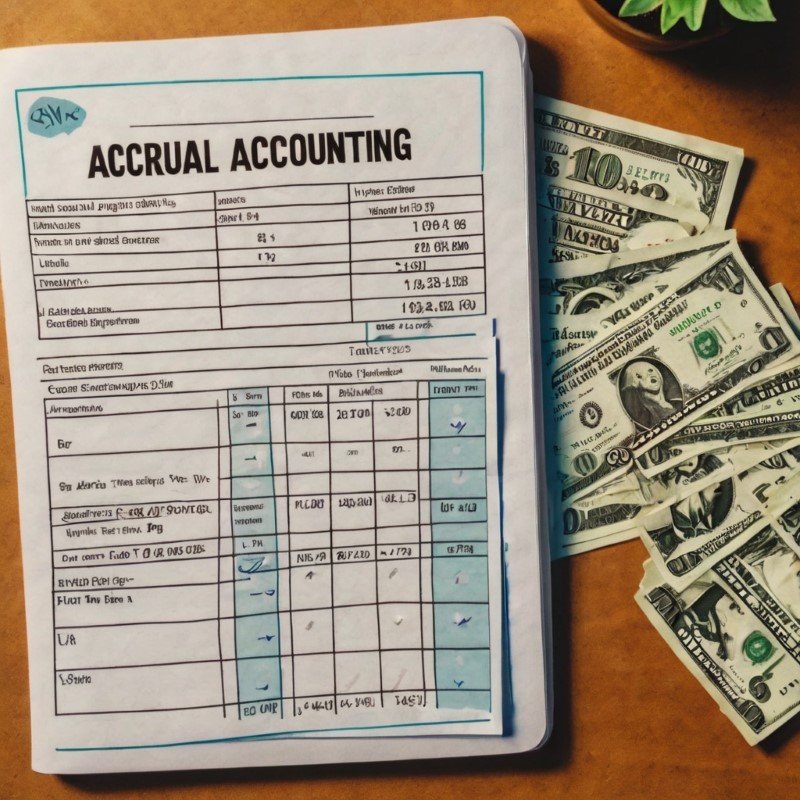Navigating the complexities of accounting methods is crucial for small business success, especially when it comes down to choosing between accrual accounting and cash basis accounting. Understanding the difference between these two fundamental accounting concepts, often framed as accrual vs cash or cash basis vs accrual basis, can significantly impact how you report income and expenses.
This choice influences your financial insights and tax obligations. It’s not merely a decision about numbers; it’s about adopting a methodology that aligns with your business operations, financial goals, and long-term growth strategies. Given the significance of these decisions for tax purposes and financial forecasting, it’s essential to grasp the nuances of each approach, whether it’s cash accounting vs accrual or accrual accounting vs cash, to make informed choices.
This article will guide you through the key aspects of cash basis accounting and accrual accounting, highlighting the advantages and disadvantages of each to help you discern which method best suits your small business.
As we delve into the pros and cons of cash vs accrual accounting, you’ll gain insights into how each method handles reporting income and expenses.pivotal for accurate financial planning and tax reporting Understanding these differences, along with the implications for your small business, will equip you with the knowledge to choose between cash or accrual accounting, ensuring your accounting practices are not only compliant but optimize your financial outcomes.
This understanding is pivotal when considering the difference between cash and accrual basis of accounting, enabling you to make an informed decision on whether the cash method vs accrual method, or explaining the difference between the cash accounting method and the accrual accounting method, best fits your business model.

Table of Contents
Understanding Traditional Accounting Methods
Definition and Importance
Traditional accounting, also known as accrual basis accounting, involves recording financial transactions as they occur, regardless of when cash transactions happen. This method aligns with Generally Accepted Accounting Principles (GAAP) and is essential for Providing a realistic view of a company’s financial health by recognizing revenue and expenses at the time they are incurred is a hallmark of the accrual based method of accounting, also known as the accrual method of accounting. This approach allows for a more accurate reflection of financial performance.Traditional accounting is crucial for businesses as it allows for a more accurate picture of financial performance, essential for effective management and strategic planning. This practice is a cornerstone of financial accounting, offering a clear snapshot of a company’s fiscal health.
Overview of Traditional Accounting Practices
Traditional accounting practices involve the use of physical ledgers and journals where transactions are manually entered using double-entry bookkeeping. This method, the backbone of financial reporting for decades, ensures compliance and provides a clear trail of financial activities through meticulous accounting entries. However, traditional accounting can be labor-intensive and time-consuming, requiring a high level of expertise to manage effectively. Despite these challenges, many small businesses and companies in sectors with less complex transactions still find traditional accounting methods suitable due to their simplicity and the direct control they offer over financial documentation.
Adaptability to Modern Business Environment
The adaptability of traditional accounting in today’s fast-paced business environment is a topic of considerable debate. While traditional methods provide a solid foundation for financial reporting, they often lack the flexibility to quickly respond to the dynamic needs of modern businesses. As companies evolve, there is a growing need to integrate technology and real-time data analytics to enhance decision-making and financial management. Emerging technologies like AI-driven automation and blockchain are transforming traditional accounting practices.enabling more efficient operations and providing deeper insights into financial dataNonetheless, for businesses to remain competitive, it is crucial to blend traditional accounting practices with modern technological advancements to achieve a more dynamic and responsive accounting function.
By understanding these traditional accounting methods, you can better appreciate how they serve as a foundation for current practices and the importance of evolving these methods to meet contemporary business demands.
Pros and Cons of Cash Basis Accounting
Understanding Cash Basis Accounting
Cash basis accounting is a straightforward method where transactions are recorded only when cash is exchanged, embodying the simplicity of the cash method.. This means that revenues are recognized when received, and expenses are recorded when paid. Unlike accrual accounting, which records transactions when they are incurred, cash basis accounting simplifies financial tracking by focusing solely on cash flows. This method is particularly appealing to startups and small businesses due to its simplicity and minimal record-keeping requirements.
Advantages for Small Businesses
One of the primary advantages of cash basis accounting is its simplicity and ease of implementation. Small businesses often favor this method as it requires less accounting knowledge and fewer resources to maintain accurate books. The clear visibility of cash flow is another significant benefit, allowing businesses to understand their financial position at any given time. This method can also offer tax advantages by allowing businesses to time their income and expenses strategically to minimize tax liabilities. Furthermore, cash basis accounting is typically supported by many accounting software solutions, making it even easier for small businesses to manage their finances effectively within the accounting system and conventions.
Limitations and Considerations
Despite its advantages, cash basis accounting has several limitations that can impact business decision-making. This method does not account for receivables or payables, which can provide a misleading picture of a company’s long-term financial health. It can lead to significant fluctuations in financial reporting from one period to another, depending on cash flow rather than actual business activity. Additionally, the primary difference between the accrual basis and the cash basis of accounting is that the latter does not recognize transactions until actual cash is exchanged.cash basis accounting is not compliant with Generally Accepted Accounting Principles (GAAP), which can be a critical drawback for businesses that need to present their financial statements to investors or lenders. Moreover, as businesses grow and their financial needs become more complex, they may find it necessary to switch to accrual accounting, which can be a challenging and time-consuming process. Accrual basis accounting differs from cash basis accounting in that accrual basis accounting records transactions when they occur, regardless of when cash is exchanged.
By understanding both the advantages and limitations of cash basis accounting, you can make a more informed decision about whether it is the right approach for your small business. This method provides simplicity and immediate insight into cash flow, but it’s important to consider the potential long-term implications and the need for compliance with broader accounting standards.
Pros and Cons of Accrual Basis Accounting
Exploring Accrual Basis Accounting
Accrual accounting is a method where revenue and expenses are recorded when they are earned or incurred, irrespective of when the actual cash transactions occur. This approach is based on two core accounting principles: the matching principle, which dictates that expenses should be reported in the same accounting period as the related revenue, and the revenue recognition principle, which states that revenue should be recognized when it is earned, not when the cash is received. These principles are foundational to the accrual method.
Benefits for Accurate Financial Forecasting
One of the significant advantages of accrual accounting is its ability to provide a real-time view of a company’s finances, making it easier for you to monitor financial activities and manage your business’s finances effectively. This method allows for a comprehensive understanding of financial health beyond mere cash transactions.more accurate assessment of financial responsibilities and resources, which is crucial for managing debt, income, and overall financial activity. Accrual accounting enables better financial tracking on both an overall and individual basis, helping businesses manage costs, finances, and risks more efficiently. Additionally, by recognizing revenue at the time it is earned and expenses when they are incurred, accrual accounting adheres to key accounting policies and assumptions, ensuring a more accurate depiction of a company’s financial status.can lead to cost savings by reducing tax liabilities.
Complexities and Compliance Requirements
Despite its benefits, accrual accounting can be complex and challenging to implement. It requires a consistent process for defining when and how to record certain types of expenses and income, which can complicate tax forms and financial reporting. Accrual accounting also necessitates various asset and liability accounts not needed in cash-based accounting, such as accrued expenses and prepaids, which require their own reconciliation and tracking for accuracy. Furthermore, while accrual accounting provides a clearer picture of financial health, it can lead to misperceptions of a company’s financial status, as profits may be reported even when there are no corresponding cash inflows, potentially leading to cash flow issues. This complexity underscores the importance of understanding accounting profession standards, requirements, procedures, treatment, and terminology.
By understanding the pros and cons of accrual basis accounting, you can better decide if this method suits your business needs. It offers detailed insights into financial health and aids in compliance with Generally Accepted Accounting Principles (GAAP), but it also requires careful management and understanding to be effectively implemented, following established accounting rules.
Choosing Between Cash and Accrual Accounting for Your Small Business
Factors to Consider
When you’re weighing the options between cash and accrual accounting for your small business, it’s crucial to consider several factors. Reflect on your business’s size and the intricacy of your financial dealings. For smaller enterprises with straightforward transactions, cash accounting, supported by basic accounting services, might be the ideal fit. Conversely, for businesses navigating more complex financial landscapes, accrual accounting, enhanced by comprehensive accounting services, could offer a better perspective, especially if you’re anticipating rapid growth and need a system that can keep pace.
Inventory management is another critical aspect to consider. If your business holds a significant inventory, accrual accounting, with its emphasis on inventory accounting, becomes essential for accurately synchronizing revenue with expenses within the same accounting periods. Moreover, your decision might also be influenced by legal and tax obligations, which could necessitate a specific approach.exceeding $25 million are required to use accrual accounting under U.S. GAAP standards.
Impact on Financial Statements and Taxes
The choice of accounting method profoundly influences your financial statements and tax reporting. Cash basis accounting, while offering a clear snapshot of cash flow, might not fully capture your business’s financial health over the long term, as it overlooks pending receivables and payables. This approach could potentially skew the financial performance reported to stakeholders, as highlighted in IRS Publication 538. It’s a method that simplifies income tax reporting but may not reflect the fiscal year’s comprehensive financial activities, affecting the accuracy of tax returns.
Conversely, accrual accounting provides a more detailed picture of your company’s financial health by incorporating accounts receivable and payable into your financial statements. This method adheres to the matching principle, ensuring revenues and expenses are recorded in the same period, which significantly improves the accuracy of financial reporting and tax accounting.However, it’s worth noting that the accrual method can lead to income tax liabilities on revenues before they’re actually received, presenting a unique challenge in financial management., which could impact cash flow for smaller businesses with tighter cash management needs.
Transitioning Between Methods
Transitioning between cash and accrual accounting is a pivotal decision that entails numerous steps. If you’re moving towards accrual accounting, it’s essential to begin documenting transactions as they happen, not just when cash is exchanged. This shift means adding accrued expenses and accounts receivable to your ledger, alongside adjusting for prepayments and cash receipts in line with the accrual principle, involving a detailed look at accounts payable and other accounting transactions.
It’s important to note that Once you’ve selected an accounting method, the IRS mandates adherence to it throughout the tax year, underscoring the importance of a thoughtful decision.Should you opt for a change in your accounting method, it’s necessary to file IRS Form 3115 to officially request this change. Given the complexity of transitioning, especially if considering a short tax year or a change in tax year, early planning and consulting with accounting experts can streamline the process, ensuring compliance with all regulatory standards.
By meticulously evaluating these considerations and grasping their impact on your financial statements and tax commitments, you’re better equipped to choose the most fitting accounting method for your small business, possibly integrating managerial accounting insights for an informed approach.
Conclusion
Deciding between cash basis and accrual accounting methods presents a significant crossroad for small business owners, each method bringing its unique set of benefits and challenges. Making an informed choice requires a deep dive into various factors, including business size, transaction complexity, inventory management, and tax implications. This discussion aims to demystify the decision-making process, empowering entrepreneurs with a clearer understanding of both accounting methods.accurate financial planning, tax reporting, and ensuring the long-term success of your business.
As you weigh your options, remember that the choice between cash and accrual accounting goes beyond mere preference; it’s about finding the right fit that will offer the most accurate financial insights for your specific business needs. By reflecting on your business’s current position and future aspirations, you can select an accounting method that not only complies with legal requirements but also positions your business for growth and success. Incorporating accounting estimates and anticipating accounting changes, small business owners are better equipped to make informed decisions, ensuring their accounting practices support their financial goals and business strategies.
FAQs
The cash accounting method, often referred to as the cash method, is best suited for small businesses looking for a simple way to track income and expenses. This method only records revenue when payment is actually received, offering a straightforward approach to financial management.
According to Section 448(a) of the Internal Revenue Code, certain entities are mandated to use accrual accounting. These include C corporations, partnerships with at least one C corporation as a partner, and tax shelters. This accrual method requires businesses to recognize transactions within the calendar year or fiscal year they occur, regardless of cash flow.
Small businesses might prefer cash-basis accounting if they are looking for simplicity and have a method to keep track of pending payments. However, for those that extend or rely on credit, accrual-basis accounting might offer a more accurate reflection of their financial situation, balancing the cash method with the accrual method for comprehensive financial oversight.
The key difference between cash and accrual accounting lies in the timing of revenue and expense recognition. Cash basis accounting, known as the cash method, records transactions when cash changes hands. In contrast, accrual basis accounting, or the accrual method, records transactions when they are billed or invoiced, regardless of when the cash transaction occurs. This distinction is crucial for income tax reporting and financial analysis.
Get Your Website Free Audit Report Today!
Newsletter
Latest Post

SEO Optimization Companies: Best Picks for 2024

Web Application Basics: Everything You Need to Know


Small Business Bookkeeping: Essential Tips for 2024


